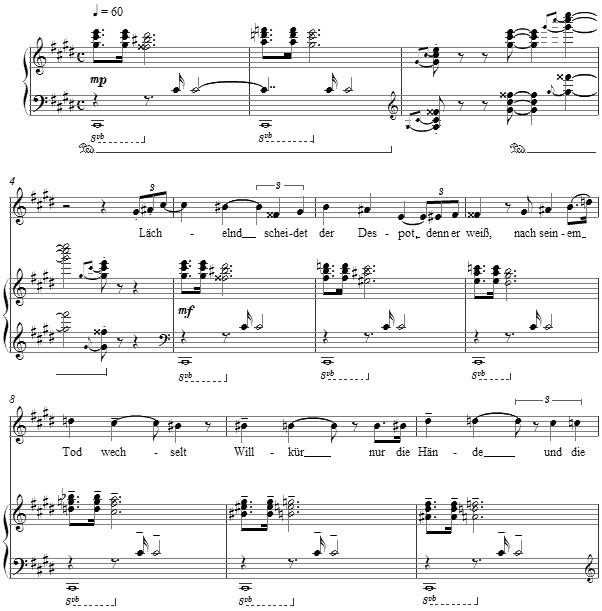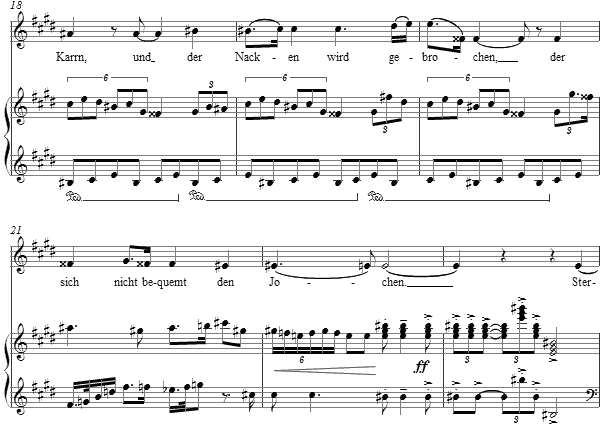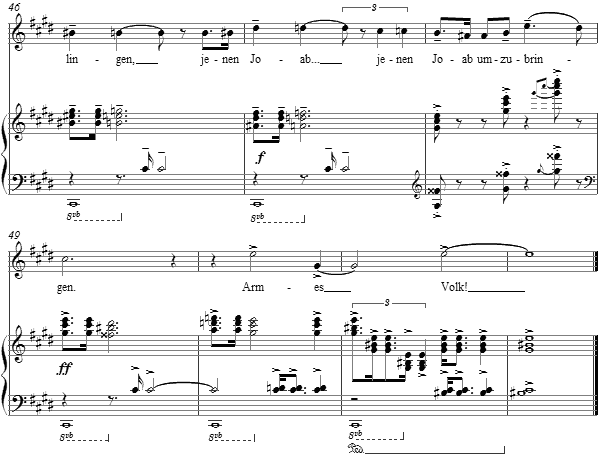Music and Texts of GARY BACHLUND
Vocal Music | Piano | Organ | Chamber Music | Orchestral | Articles and Commentary | Poems and Stories | Miscellany | FAQs
König David - (2010)
Heinrich Heine
for medium voice and piano
Lächelnd scheidet der Despot,
denn er weiß, nach seinem Tod
wechselt Willkür nur die Hände,
und die Knechtschaft hat kein Ende.
Armes Volk! wie Pferd und Farrn
bleibt es angeschirrt am Karrn,
und der Nacken wird gebrochen,
der sich nicht bequemt den Jochen.
Sterbend spricht zu Salomo
König David: Apropos,
daß ich Joab dir empfehle,
einen meiner Generäle.
Dieser tapfre General
ist seit Jahren mir fatal,
doch ich wagte den Verhaßten
niemals ernstlich anzutasten.
Du, mein Sohn, bist fromm und klug,
gottesfürchtig, stark genug,
und es wird dir leicht gelingen,
jenen Joab umzubringen.[ 4 pages, circa 3' 30"]
Heinrich Heine
King David
Smiling fails the tyrant,
For he knows, after his death,
Power only changes hands
And slavery has no end.
Poor people! like horse and groom
Remain harnessed to the cart,
And necks will be broken,
If they consent not to their yoke.
Dying speaks Solomon to
King David: "And for this,
I recommend to you, Joab,
One of my generals.
"This gallant general
Has been working secretly against me,
But against this hated one
I never acted in earnest.
"You, my son, are pious and wise,
God-fearing, strong enough
And in time you can easily
Kill one like a Joab."
gb
Heine has taken the story from I Kings 2:1-7 [ 1 ] in which Solomon's charge is somewhat more personal and wholly unrelated to a people governed, and applied it to the more universal complaint of tyrannical government. For this the poet interpolates the images of horses and driver, the breaking of necks and slavery. Heine, of Jewish background but a convert to Lutheranism in his time in Germany as well as correspondent with Karl Marx, had notions of class struggle in his thinking, and this tale constructed on top of a biblical story allows that generalized political sentiment to ride atop the fabled names of Solomon and David. In our modern day one sees families of tyrants operating much in the manner of Heine's vision, as the Kims pass North Korea from generation to generation, or as the economic stagnation of Cuba is being passed from "revolutionary" to his own brother. Another horrid image which comes to my mind is the film of a young Saddam Hussein acquiring his tyrannical power ordering Iraqi party legislators to leave the room, whereupon many were summarily shot. The tale is old and the tale is wholly contemporary, for true tyranny continues to live in the modern era.
The setting is a large falling line of minor triadic chromaticism over a tonic pedal, over which the first and last stanzas of the poem are articulated. That chromaticism invites the vocal line into darkly twisting shapes to tell the tale of tyranny and the passing of power from generation to generation.
The countersubject to chromaticism over its tonic pedal is a blurred gesture, recalling the "harp" in so many settings about King David, this in the tonic minor with its major seventh and a decorative line in the right hand including more dissonant half-step lower neighbors.
The last stanza's vocal line rises at the verb "umzubringen," and a last cry to remember the "poor people" of Heine's vision of tyranny passed from generation to generation ends the setting.
The score for König David is available as a free PDF download, though any major commercial performance or recording of the work is prohibited without prior arrangement with the composer. Click on the graphic below for this piano-vocal score.
NOTES
[ 1 ] I include the biblical passage in a King James, to show the trunk onto which Heine grafts his branch.
That translation reads: 1) Now the days of David drew nigh that he should die; and he charged Solomon his son, saying, 2) go the way of all the earth: be thou strong therefore, and shew thyself a man; 3) And keep the charge of the LORD thy God, to walk in his ways, to keep his statutes, and his commandments, and his judgments, and his testimonies, as it is written in the law of Moses, that thou mayest prosper in all that thou doest, and whithersoever thou turnest thyself: 4) That the LORD may continue his word which he spake concerning me, saying, If thy children take heed to their way, to walk before me in truth with all their heart and with all their soul, there shall not fail thee (said he) a man on the throne of Israel. 5) Moreover thou knowest also what Joab the son of Zeruiah did to me, and what he did to the two captains of the hosts of Israel, unto Abner the son of Ner, and unto Amasa the son of Jether, whom he slew, and shed the blood of war in peace, and put the blood of war upon his girdle that was about his loins, and in his shoes that were on his feet. 6) Do therefore according to thy wisdom, and let not his hoar head go down to the grave in peace. 7) But shew kindness unto the sons of Barzillai the Gileadite, and let them be of those that eat at thy table: for so they came to me when I fled because of Absalom thy brother.



